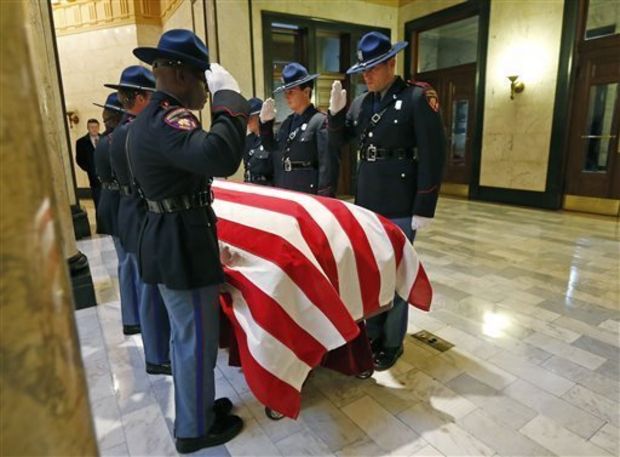

JACKSON, Mississippi (AP) — State Rep. Mack McInnis helped 1994 become one of the worst years for Mississippi inmates.
McInnis, who died in April at age 79, wanted inmates to wear stripes. How he said it put him in the national spotlight.
During a 1994 special session on prison construction, lawmakers barred weightlifting equipment, individual TV sets, radios and air conditioners from cells. They also required inmates to wear striped uniforms with CONVICT on the back. Different colors of stripes designate the prisoner’s status.
McInnis, a Democrat from Lucedale, wanted the inmates in stripes, but went even further.
“We want a prisoner to look like a prisoner, to smell like a prisoner and taste like a prisoner. When you see one of these boogers aloose, you’ll say ‘I didn’t know we had zebras in Mississippi.’ Some of them prisoners, you couldn’t humiliate them with a humiliatin’ machine.”
A few months later, corrections officials balked at the estimated $1 million cost.
“I don’t care if it costs $10 million,” McInnis said. “It was my intention to a make those prisoners look like prisoners. And I know you psychologists and all … say, ‘Well, that’s humiliating.’ Well, that’s damn good. I want it to be.”
The inmates got stripes.
McInnis’ death was one of dozens of public figures in Mississippi in 2013.
Former state Rep. John Hampton Stennis, the only son of the late Sen. John C. Stennis, died in September at age 78. The Democrat served 15 years in the Mississippi House.
As chairman of the House Banks and Banking Committee, Stennis shepherded a rewriting of Mississippi’s laws in the shadow of the failure of Banker Trust Savings & Loan Association in 1976.
At that time, 150,000 people had money in 34 state-chartered, but not federally insured, thrifts. Total deposits were $450 million. The largest of them was Jackson-based Bankers Trust with $200 million in assets.
Bankers Trust went into receivership in May 1976, cutting depositors off from their funds.
The law placed a moratorium on business being conducted by state-chartered S&L’s until they became federally insured. The law was repealed in 1997.
Also passing away in 2013 was former Gov. Bill Allain, a Democrat who appointed significant numbers of women and minorities to government jobs and strengthened the executive branch by removing legislators from state boards, died in December. He was 85.
Allain was governor from 1984 to 1988, after serving a term as attorney general from 1980 to 1984.
He wouldn’t say which statewide job he preferred.
“As attorney general, you get up in the morning and you drink coffee and have breakfast and you go and you get your staff together and you say, ‘Who we going to give hell to today?’ And as governor you get up and do the same thing but your staff says, ‘Who’s giving us hell today?'” Allain told The Associated Press in 2001.
Among other deaths in Mississippi in 2013:
— Former state Sen. Jim Bean, a Republican who championed rural health care and programs for children and the elderly, died in July. He was 80.
— Donald W. Zacharias, the beloved former president of Mississippi State University, died in February. He was 77.
— Former state Rep. Billy Thames, a Democrat who pressed for improvements in mental health programs, died in September. He was 69.
— Lillie B. Ayers, who became the lead plaintiff in Mississippi’s college desegregation lawsuit after the death of her husband, died in March. She was 85.
— Donald A. Cabana, a longtime corrections official who oversaw executions as warden at the Mississippi State Penitentiary in the 1980s and later came to oppose the death penalty, died in October. He was 67.

